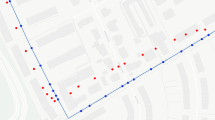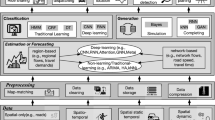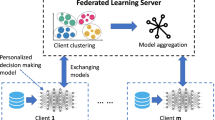Abstract
The task of personalized route query is to find the optimal trip that contains the keywords specified by the query user and satisfies the travel distance constraints. The previous studies mostly focus on collaborative filtering by considering user similarity. Trust is one of the most important factors in decision-making that has been neglected by the existing studies of personalized route query. In this paper, we propose a new type of personalized route query by incorporating trust. We propose a social trust-based optimal trip selection (STOTS) framework for personalized route query. STOTS consists of three key components. The first component predicts social trust based on extreme learning machine (ELM), denoted STP-ELM, that exploits social information and user behavioral patterns as features. In the second component, we propose a novel model to incorporate social trust into personalized route query. Additionally, we propose an index to speed up query processing. In the third component, we propose an optimal route query algorithm called RouteHunter that aims to find an appropriate route satisfying the user-specified constraints. The experiment results show that (1) our social trust prediction approach based on ELM attains superior regression efficiency compared to other traditional methods; (2) our proposed index can efficiently accelerate personalized route query processing; and (3) our route query approach can achieve a better performance than the baseline approach. This paper studies a novel personalized route query incorporating social trust in location-based social networks. We propose a social trust-based optimal trip selection (STOTS) framework that uses ELM to evaluate social trust, applies a ranking model to incorporate social trust, and includes an algorithm to find the required route. Experimental results encouragingly demonstrate the efficiency and effectiveness of our proposed approach.












Similar content being viewed by others
References
Adwereboamah J, Hufstedler S. Predicting social trust with binary logistic regression. Research in Higher Education Journal 2015;27:6.
Brandes U. A faster algorithm for betweenness centrality. J Math Sociol 2001;25(2):163–177.
Cao K, Wang G, Han D, Ning J, Zhang X. Classification of uncertain data streams based on extreme learning machine. Cogn Comput 2015;7(1):150–160.
Cao X, Chen L, Cong G, Xiao X. Keyword-aware optimal route search. Proceedings of the VLDB Endowment 2012;5(11):1136–1147.
Cortes C, Vapnik V. Support-vector networks. Mach Learn 1995;20(3):273–297.
Dai J, Liu C, Xu J, Ding Z. On personalized and sequenced route planning. World Wide Web 2016; 19(4):679–705.
Deng C, Wang S, Li Z, Huang GB, Lin W. 2017. Content-insensitive blind image blurriness assessment using weibull statistics and sparse extreme learning machine. IEEE Trans Syst Man Cybern: Syst.
Duan L, Bao M, Cui S, Qiao Y, Miao J. Motor imagery eeg classification based on kernel hierarchical extreme learning machine. Cogn Comput 2017;9(6):758–765.
Falcone R, Castelfranchi C. Social trust: a cognitive approach. Trust and deception in virtual societies, p. 55–90. Springer; 2001.
Floyd RW. Algorithm 97: shortest path. Commun ACM 1962;5(6):345.
Freeman LC. A set of measures of centrality based on betweenness. Sociometry 1977;40(1):35–41.
Golbeck J, Hendler J. Inferring binary trust relationships in web-based social networks. ACM Trans Internet Technol (TOIT) 2006;6(4):497–529.
Guha R, Kumar R, Raghavan P, Tomkins A. Propagation of trust and distrust. Proceedings of the 13th international conference on World Wide Web. p. 403–412. ACM; 2004.
Guo T, Zhang L, Tan X. Neuron pruning-based discriminative extreme learning machine for pattern classification. Cogn Comput 2017;9(4):581–595.
Gutierrez-Garcia JO, Lpez-Neri E. Cognitive computing: a brief survey and open research challenges. International conference on applied computing and information technology/ international conference on computational science and intelligence. p. 328–333; 2015.
Hang CW, Wang Y, Singh MP. Operators for propagating trust and their evaluation in social networks. Proceedings of The 8th International Conference on Autonomous Agents and Multiagent Systems-Volume 2. p. 1025–1032. International Foundation for Autonomous Agents and Multiagent Systems; 2009.
Heinermann J, Kramer O. 2014. Precise wind power prediction with SVM ensemble regression springer international publishing.
Huang GB, Chen L, Siew CK, et al. Universal approximation using incremental constructive feedforward networks with random hidden nodes. IEEE Trans Neural Networks 2006;17(4):879–892.
Huang GB, Siew CK. Extreme learning machine: Rbf network case. Control, automation, robotics and vision conference, 2004. ICARCV 2004 8th. vol. 2, p. 1029–1036. IEEE; 2004.
Huang GB, Wang DH, Lan Y. Extreme learning machines: a survey. International Journal of Machine Learning and Cybernetics 2011;2(2):107–122.
Huang GB, Zhu QY, Siew CK. Extreme learning machine: a new learning scheme of feedforward neural networks. IEEE international joint conference on Neural networks, 2004. Proceedings. 2004. vol. 2, p. 985–990. IEEE; 2004.
Huang GB, Zhu QY, Siew CK. Extreme learning machine: theory and applications. Neurocomputing 2006; 70(1):489–501.
Jamali M, Ester M. Trustwalker: a random walk model for combining trust-based and item-based recommendation. Proceedings of the 15th ACM SIGKDD international conference on Knowledge discovery and data mining. p. 397–406. ACM; 2009.
Jamali M, Ester M. A matrix factorization technique with trust propagation for recommendation in social networks. ACM Conference on recommender systems, p. 135–142; 2010.
Kurashima T, Iwata T, Irie G, Fujimura K. Travel route recommendation using geotags in photo sharing sites. Proceedings of the 19th ACM international conference on Information and knowledge management, p. 579–588. ACM; 2010.
Li F, Cheng D, Hadjieleftheriou M, Kollios G, Teng SH. On trip planning queries in spatial databases. International symposium on spatial and temporal databases, p. 273–290. Springer; 2005.
Liu G, Wang Y, Orgun MA, Liu H. Discovering trust networks for the selection of trustworthy service providers in complex contextual social networks. 2012 IEEE 19th international conference on web services (ICWS). p. 384–391. IEEE; 2012.
Liu N, Sakamoto JT, Cao J, Koh ZX, Ho AFW, Lin Z, Ong MEH. Ensemble-based risk scoring with extreme learning machine for prediction of adverse cardiac events. Cogn Comput 2017;9(4):545–554.
Mao W, Jiang M, Wang J, Li Y. Online extreme learning machine with hybrid sampling strategy for sequential imbalanced data. Cogn Comput 2017;9(6):780–800.
Navarro G. A guided tour to approximate string matching. ACM Comput. Surv. 2001;33(1):31–88.
Oneto L, Bisio F, Cambria E, Anguita D. Slt-based elm for big social data analysis. Cogn Comput 2017;9(2):259–274.
Scott J. 2012. Social network analysis. Sage.
Tang M, Xu Y, Liu J, Zheng Z, Liu X. Trust-aware service recommendation via exploiting social networks. IEEE International conference on services computing, p. 376–383; 2013.
Taylor JG. Cognitive computation. Cogn Comput 2009;1(1):4–16.
Walter FE, Battiston S, Schweitzer F. A model of a trust-based recommendation system on a social network. Auton Agent Multi-Agent Syst 2008;16(1):57–74.
Wang B, Zhu R, Luo S, Yang X, Wang G. H-mrst: a novel framework for supporting probability degree range query using extreme learning machine. Cogn Comput 2017;9(1):68–80.
Wang H, Hernandez JM, Van MP. Betweenness centrality in a weighted network. Phys Rev E Stat Nonlin Soft Matter Phys 2008;77(4 Pt 2):046105.
Wang S, Deng C, Lin W, Huang GB, Zhao B. Nmf-based image quality assessment using extreme learning machine. IEEE transactions on cybernetics 2017;47(1):232–243.
Wang Y, Varadharajan V. Role-based recommendation and trust evaluation. The 9th IEEE international conference on E-commerce technology and the 4th IEEE international conference on enterprise computing, e-commerce, and e-services, 2007. CEC/EEE 2007, p. 278–288. IEEE; 2007.
Wong PK, Gao XH, Wong KI, Vong CM. An analytical study on reasoning of extreme learning machine for classification from its inductive bias. Cogn Comput 2016;8(4):746–756.
Wu H, Yue K, Pei Y, Li B, Zhao Y, Dong F. Collaborative topic regression with social trust ensemble for recommendation in social media systems. Knowl-Based Syst 2016;97(C):111–122.
Wu J, Xiong R, Chiclana F. Uninorm trust propagation and aggregation methods for group decision making in social network with four tuple information. Knowl-Based Syst 2016;96:29–39.
Xu L, Ding S, Xu X, Zhang N. Self-adaptive extreme learning machine optimized by rough set theory and affinity propagation clustering. Cogn Comput 2016;8(4):720–728.
Xu Y, Hu T, Li Y. A travel route recommendation algorithm with personal preference. 2016 12th international conference on natural computation, fuzzy systems and knowledge discovery (ICNC-FSKD), p. 390–396. IEEE; 2016.
Zeng Y, Chen X, Cao X, Qin S, Cavazza M, Xiang Y. Optimal route search with the coverage of users’ preferences. IJCAI, p. 2118–2124; 2015.
Zhang Z, Zhao X, Wang G. FE-ELM: a new friend recommendation model with extreme learning machine. Cogn Comput 2017;9 (3):1–12.
Zheng X, Wang Y, Orgun MA, Zhong Y, Liu G, et al. Trust prediction with propagation and similarity regularization. AAAI, p. 237–244; 2014.
Zhu R, Wang B, Yang X, Zheng B, Wang G. Sap: Improving continuous top-k queries over streaming data. IEEE Trans Knowl Data Eng 2017;29(6):1310–1328.
Funding
This research is partially funded by the National Natural Science Foundation of China (Grant Nos. 61572119, 61622202, 61732003, 61729201, 61702086, and U1401256) and the Fundamental Research Funds for the Central Universities of China (Grant Nos. N150402005 and N171904007).
Author information
Authors and Affiliations
Corresponding author
Ethics declarations
Conflict of interest
The authors declare that they have no conflicts of interest.
Informed Consent
Informed consent was obtained from all individual participants.
Human and Animal Rights
This article does not contain any studies involving human participants and/or animals by any of the authors.
Rights and permissions
About this article
Cite this article
Ma, Y., Yuan, Y., Wang, G. et al. Trust-Aware Personalized Route Query Using Extreme Learning Machine in Location-Based Social Networks. Cogn Comput 10, 965–979 (2018). https://doi.org/10.1007/s12559-018-9600-y
Received:
Accepted:
Published:
Issue Date:
DOI: https://doi.org/10.1007/s12559-018-9600-y




